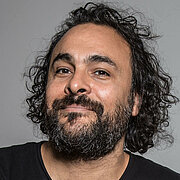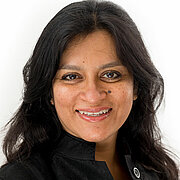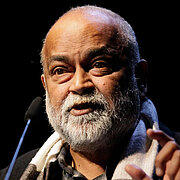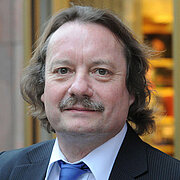How has what was unacceptable yesterday become the new normal?
As part of the series, The contested idea of Europe: Global perspectives and possibilities for European cultural policy, co-hosted by the Hertie School and the Federal Foreign Office, the French-Algerian artist Kader Attia held a lecture on 1 November examining why expressions of bigotry in society are again becoming "normalised". Attia raised questions about why such expressions, long objectionable, could again become acceptable. How has the irrationality of emotion been rationalized by political manipulators into the hatred of others?
"Our contemporary world is haunted by wounds from the past. These wounds leave traces and produce ghosts which shape our politics, within and beyond Europe, today," Kadia told the audience. "The Tunisian psychoanalyst Fethi Benslama made this observation in the film Reflecting Memory, 'In modern countries (…) in Europe or elsewhere in the world, (…) the streets are named after dead people. We travel through the arteries of the dead. The world in which we live is a kind of psychological tomb where dead people live on as ghosts."
Ananya Jahanara Kabir, Professor of English Literature at King’s College London, gave a response. Kabir researches the intersection of the written text with other forms of cultural expression within acts of collective memorialisation and forgetting.
Helmut K. Anheier, Professor of Sociology and Past President of the Hertie School and Andreas Görgen, Head of the Cultural and Communications Department of the Federal Foreign Office, gave the opening remarks.
The lecture was followed by a discussion with Kader Attia, Ananya Jahanara Kabir, Arjun Appadurai, Professor of Anthropology and Globalisation at the Hertie School, and Helmut K. Anheier.
Speaker

Kader Attia grew up in Paris and in Algeria. Preceding his studies at the École Supérieure des Arts Appliqués Duperré and the École Nationale Supérieure des Arts Décoratifs in Paris, and at Escola Massana, Centre d'Art i Disseny in Barcelona, he spent several years in Congo and in South America.
The experience of living between different cultures, the histories of which over centuries have been characterised by rich trading traditions, colonialism and multi-ethnic societies, has fostered Kader Attia’s intercultural and interdisciplinary approach of research. For many years, he has been exploring the perspective that societies have on their history, especially as regards experiences of deprivation and suppression, violence and loss, and how this affects the evolving of nations and individuals — each of them being connected to collective memory.
His socio-cultural research has led Kader Attia to the notion of Repair, a concept he has been developing philosophically in his writings and symbolically in his oeuvre as a visual artist. With the principle of Repair being a constant in nature — thus also in humanity —, any system, social institution or cultural tradition can be considered as an infinite process of Repair, which is closely linked to loss and wounds, to recuperation and re-appropriation. Repair reaches far beyond the subject and connects the individual to gender, philosophy, science, and architecture, and also involves it in evolutionary processes in nature, culture, myth and history.
Following the idea of catharsis, his work aims at Art’s re-appropriation of the field of emotion that, running from ethics to aesthetics, from politics to culture, links individuals and social groups through emotional experience, and that is in danger of being seized by recent nationalist movements
In 2016, Kader Attia founded La Colonie, a space in Paris to share ideas and to provide an agora for vivid discussion, that extends his praxis from representation to action. Focussing on decolonialisation not only of peoples but also of knowledge, attitudes and practices, it aspires to de-compartmentalise knowledge by a trans-cultural, trans-disciplinary and trans-generational approach. Driven by the urgency of social and cultural reparations, it aims at reuniting which has been shattered, or drift apart.
Kader Attia's work has been shown in group shows and biennials such as the 12th Shanghai Biennial; the 12th Gwangju Biennial; the 12th Manifesta, Palermo; the 57th Venice Biennial; dOCUMENTA(13) in Kassel; Met Breuer, New York; Kunsthalle Wien; MoMA, New York; Tate Modern, London; Centre Pompidou, Paris, or The Solomon R. Guggenheim Museum, New York - just to name a few. Notable solo exhibitions include “The Museum of Emotion”, The Hayward Gallery, London; “Scars Remind Us that Our Past is Real”, Fundacio Joan Miro in Barcelona; “Roots also grow in concrete”, MacVal in Vitry-sur-Seine; „The Field of Emotion“, The Power Plant, Toronto; Museum of Contemporary Art, Sydney; SMAK, Gent; Museum für Moderne Kunst, Frankfurt; Musée Cantonal des Beaux Arts de Lausanne; Beirut Art Center; Whitechapel Gallery, London; KW Institute for Contemporary Art, Berlin.
In 2016, he was awarded with the Marcel Duchamp Prize, followed in 2017 by the Prize of the Miró Foundation, Barcelona, and the Yanghyun Art Prize, Seoul.
(Photo: Camille Millerand)
Response

Ananya Jahanara Kabir is Professor of English Literature at King’s College London. She researches the intersection of the written text with other forms of cultural expression within acts of collective memorialization and forgetting. Through an ERC Advanced Grant (2013-2018), she led an interdisciplinary investigation into African-heritage social dance and music across language worlds. For her innovative work in the Humanities, she received the Infosys Humanities Prize (2018), awarded by the Infosys Science Foundation, India. She is spending 2019 at the Freie Universitaet, Berlin, as a recipient of the Humboldt Forschungspreis (Humboldt Prize), awarded by the Alexander von Humboldt Stiftung.
Chairs

Arjun Appadurai is Professor of Anthropology and Globalisation at the Hertie School. He is also Paulette Goddard Professor of Media, Culture, and Communication at New York University. He is an internationally recognised scholar of globalisation, the cultural dimensions of economic development, and struggles over national and transnational identity. He specialises in South Asia.

Helmut K. Anheier is Professor of Sociology at the Hertie School. He served as President of the Hertie School from 2009 to 2018. His research centres on indicator systems, social innovation, culture, philanthropy, and organisational studies. Anheier is the principal academic lead of the Hertie School's annual Governance Report (Oxford University Press). He also holds a Chair of Sociology at Heidelberg University and serves as Academic Director of the Centre for Social Investment.

